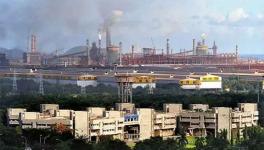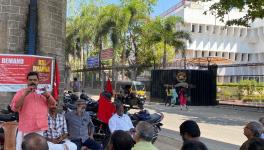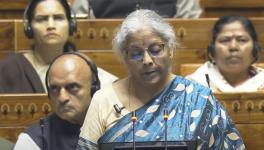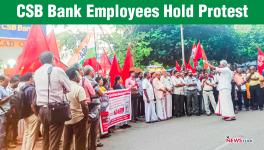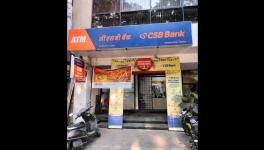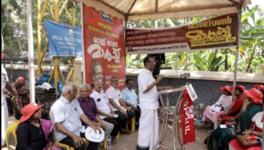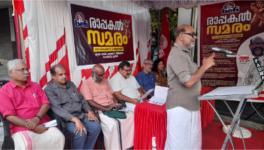Bad Bank: Doubtful About its Efficiency, Bank Employees’ Union Bats For ‘Stringent Recovery Laws’
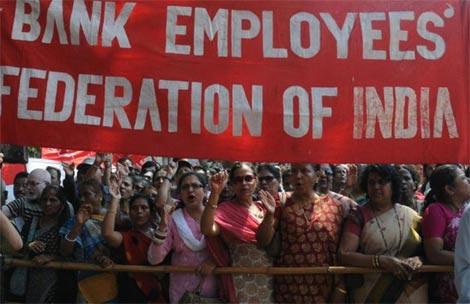
Representational Image. Image Courtesy: LiveChennai
A bank employees union on Saturday demanded a “complete overhaul with stringent recovery laws” to deal with the growing problem of stressed assets within India’s commercial banks in the form of bad debts, as it raised doubts over the efficiency of the Centre’s latest move to form a “Bad Bank”.
Finance Minister Nirmala Sitharaman had earlier this month announced the setting up of the country’s first-ever bad bank, putting back the spotlight on the issue of Non-Performing Assets (NPAs) within the Indian banking system.
Under the latest arrangement, the National Asset Reconstruction Limited (NACRL), which is 51% owned by public sector banks, will acquire stressed assets worth Rs 2 lakh crore from various commercial banks in a phased manner.
This is, “yet another module to relieve crony corporate defaulters by simply shifting loans from one pocket to another pocket, both owned by public sector banks,” said the Bank Employees Federation of India (BEFI) in a press statement on Saturday.
The federation added that since the entire problem of NPAs lies with large corporate debts, a bad bank, as envisaged by the Central Government, “can only be expected to aggregate, but not resolve the problem” altogether.
India has been reeling under the menace of stressed assets within its banking system for quite a few years now. According to an estimate, the NPAs of the scheduled commercial banks (SCBs) in the country stood at Rs 8.35 lakh crore in March this year, of which about 77.9% were the loans that remained unpaid by larger corporate borrowers mostly from the PSBs.
Additionally, the Finance Ministry in March this year had informed the Lok Sabha that the SCBs have written off loans worth Rs 5.85 lakh crore during the last three financial years, while recovery during this period amounted to a little over Rs 68,000 crore.
BEFI believes that the prevailing alarming situation with regards to the NPAs requires a “complete overhaul with stringent recovery laws,” which must also involve criminally prosecuting the large defaulting private corporate houses along with confiscating their personnel assets with regards to debt recovery and bankruptcy.
“That will only facilitate speedy recovery of the public funds in public sector banks appropriated by the corporate borrowers. The government must stop acting as a conduit to service the criminal activities of their crony business houses,” BEFI said on Saturday.
According to the latest move, banks that will enter in the transaction with the NACRL will get 15% of the value of the stressed assets in cash and the rest in the form of tradable Security Receipts (SRs). The Union Cabinet earlier on September 15 had approved a guarantee of Rs 30,600 crore to back the said SRs issued by the NACRL.
On the other hand, NACRL’s operational entity, India Debt Resolution Company Limited (IDRCL), will manage the assets with an aim to realise their value. The NACRL-IDRCL joint structure is the new bad bank.
Debasish Basu Chaudhary, general secretary, BEFI, spoke to NewsClick on Saturday over the phone and argued that the idea of transferring stressed assets to the bad bank had gained momentum since the Reserve Bank of India (RBI) had initiated an asset quality review (AQR) of Indian banks in 2015.
“However, it must be noted that, then as now, the main idea here is nothing but to keep the balance sheets of public sector banks clean and white by simply shifting their toxic assets,” said Chaudhary, adding, “this will ensure capital inflows to these banks and will, more importantly, enable smooth privatisation of the public sector banks.”
As regards the NPAs, Chaudhary added that an earlier government recovery agency under the Insolvency and Bankruptcy Code (IBC) has already failed in helping banks recover their bad loans. Introduced in 2016, IBC had sought to settle the bad debts of the defaulting corporates. Over the years, the cases of completed resolutions under it, however, show that public banks are having to take huge “haircuts” and thus, are suffering losses.
“Also, the banks themselves, along with NBFCs (Non-Banking Financial Company) and ARCs (Asset Reconstruction Company),” said Chaudhary, “have been in the business of recovering dues for a long time but they are not able to recover the dues from borrowers to the desired extent.” According to him, this is mainly due to the country's current “blunt toothless” recovery laws.
Given this, Chaudhary asked if the existing institutions have not been successful enough in the past, to what extent will they be successful in recovering the value of the stressed assets while working now with the newly formed bad bank?
Get the latest reports & analysis with people's perspective on Protests, movements & deep analytical videos, discussions of the current affairs in your Telegram app. Subscribe to NewsClick's Telegram channel & get Real-Time updates on stories, as they get published on our website.









